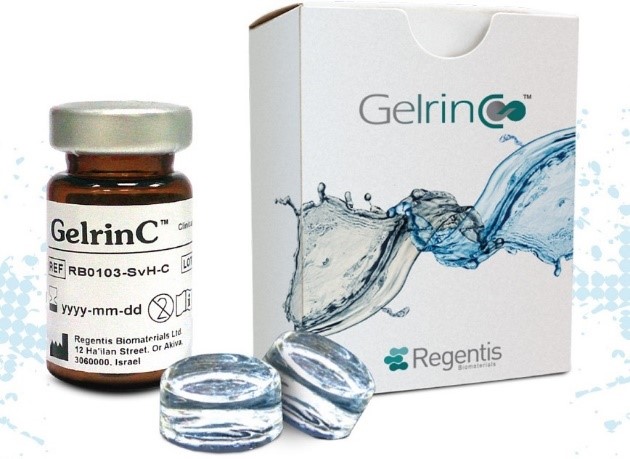
Register to receive a free Orthobiologics Market Analysis, Size, and Trends Report synopsis and brochure.
When someone injures their knee and their cartilage becomes damaged, surgery is usually required to repair the tissue. Currently, microfracture is the most common type of operation to treat damaged cartilage. New Jersey-based Regentis Biomaterials, a global biomaterials company, is looking to spur innovation in the orthopedic cartilage repair market. Their new GelrinC implant is currently going through a SAGE clinical study, which has expanded to 11 sites in the United States.
GelrinC is an implant developed specifically for articular cartilage repair. The device uses polyethylene glycol (PEG) and a structurally modified form of human fibrinogen. Fibrinogen in its natural form supports the healing process. The benefit of GelrinC is its ability to be implanted as a liquid, which allows it to take the exact shape of the defect in the cartilage. The liquid becomes a gel and allows stem cells from the patient’s body to develop on the surface and absorb the implant, becoming new cartilage.
“Cartilage repair is the largest unmet need in orthopedic sports medicine today,” said Alastair Clemow, Ph.D., president and CEO, Regentis Biomaterials. “GelrinC enables patients to harness the benefits of their own stem cells to promote cartilage regeneration in a single, minimally invasive procedure.”
iData Research’s research in the orthopedic cartilage repair segment found that microfracture procedures are the standard to which new products and procedures are compared. Their positive results and low cost create barriers to new product entry. However, surgeons that repair cartilage damage are looking out for technological developments, which are likely to involve stem cell products. The GelrinC implant creates a new alternative to microfracture, expanding the market’s product portfolio. This means that Regentis Biomaterials may positively contribute to the orthopedic cartilage repair segment of the orthobiologics market. However, market growth is conditional upon the success of the SAGE clinical study, as well as the pricing of the GelrinC implant.
In Europe, early clinical trials have demonstrated that the regenerated tissue produced by the GelrinC implant has provided excellent improvements in pain and function. The multi-center Phase III pivotal study will enroll 120 patients, with the study ending in November of 2023.
For Further Information
To get in an in-depth market overview, as well as insight through primary research and procedural volumes from 20 countries, please read iData Research’s’ 1823 page Orthobiologics Market Analysis, Size, and Trends Report.